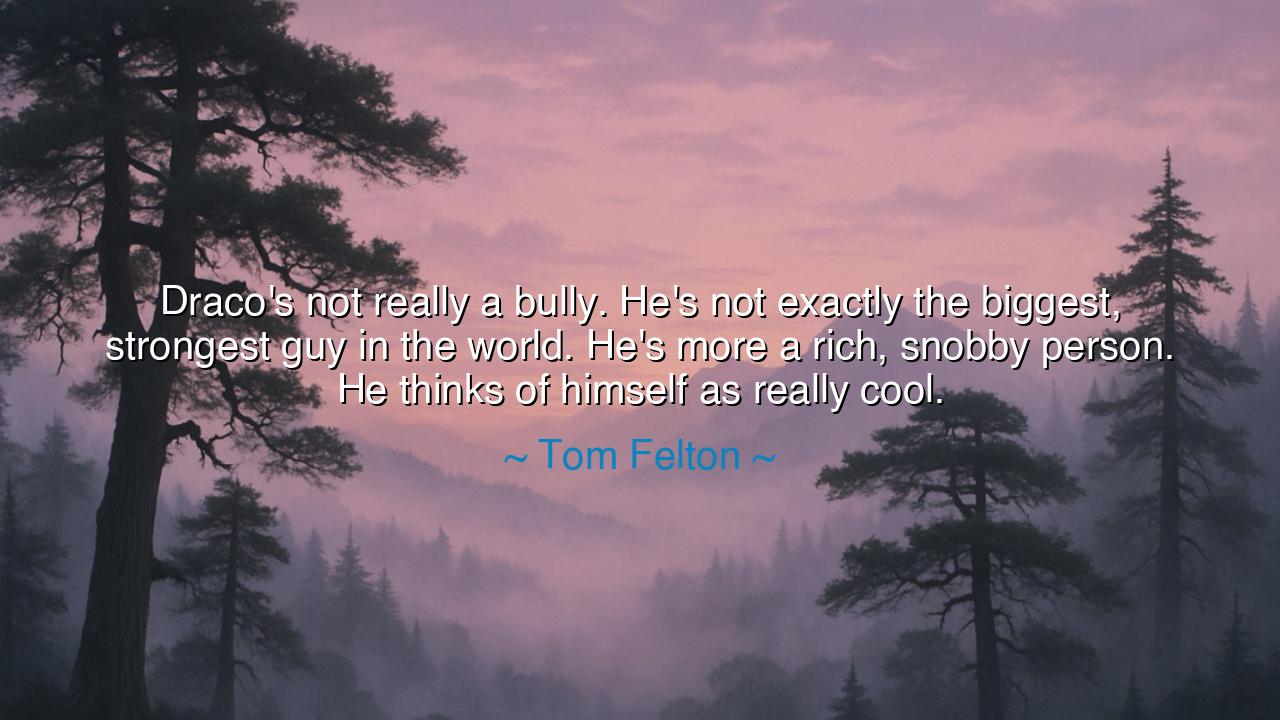
Draco's not really a bully. He's not exactly the biggest
Draco's not really a bully. He's not exactly the biggest, strongest guy in the world. He's more a rich, snobby person. He thinks of himself as really cool.






"Draco's not really a bully. He's not exactly the biggest, strongest guy in the world. He's more a rich, snobby person. He thinks of himself as really cool." These words, spoken by Tom Felton, cast light on the true nature of the character Draco Malfoy, who, despite outward appearances, is not defined by brute strength or raw aggression, but by privilege and a false sense of superiority. This reflection on Draco, the figure often seen as a bully in the world of Harry Potter, speaks not just to his personal flaws, but to the nature of power itself—how it is often mistaken for true strength. In Draco’s case, his wealth and status cloud his perception of the world, leading him to believe that he is superior to others.
In the ancient world, this type of false superiority was seen in many rulers and nobles who were born into wealth and power but lacked the true virtue of leadership. Consider King Midas, whose wealth and the golden touch led him to believe that material riches could buy him happiness and respect. Yet, his story serves as a tragic lesson that those who place their value in external power and material wealth are blind to the true sources of strength—wisdom, humility, and compassion. Midas learned too late that inner strength and character matter far more than superficial wealth, a truth that Draco Malfoy, with his snobbish arrogance, has yet to understand.
This illusion of power, built on wealth and social status, is not unique to the fictional world of Harry Potter. It mirrors the plight of many figures throughout history who mistook their privilege for true greatness. In the story of Julius Caesar, we see a man who, though powerful and revered, often surrounded himself with sycophants who flattered him into believing his own superiority. Yet, as history shows us, it was not his position that brought him down, but his inability to recognize that true strength comes from the respect of others, not the fear they might have of his power. Similarly, Draco Malfoy’s belief that his wealth and status make him superior to others is a lesson in hubris, and ultimately, in the emptiness of this kind of power.
Draco’s character, as portrayed by Tom Felton, is a reflection of a certain societal archetype—the privileged individual who uses their status to create divisions, often forgetting that true greatness lies in the ability to connect with others, not to lord over them. His belief that he is "really cool" because of his family wealth and prestige is a hollow view of the world, one that many in history have shared, from the aristocrats of France to the tyrants of ancient Rome. These figures thought they were unassailable, but their inability to build meaningful relationships, grounded in respect and kindness, led to their eventual downfall.
The lesson to be learned here is profound: true strength does not come from money or power, but from how we treat others and the virtue we embody. Draco Malfoy, much like other figures throughout history who believed that their wealth and status made them superior, teaches us that arrogance and self-importance are fleeting. Those who focus solely on material wealth or external status are bound to find that these things do not provide lasting fulfillment or respect. The coolness Draco perceives in himself is not rooted in his character or integrity, but in his misguided beliefs about what makes a person valuable.
In our own lives, we must reflect on the nature of true strength. Just as Draco Malfoy’s story serves as a warning against pride and privilege, we must remember that our worth is not defined by the things we own or the status we hold. It is defined by our actions, the kindness we show, and the humility with which we approach others. Like the ancient leaders who learned, sometimes too late, that power is best used with wisdom, we too must seek to cultivate inner strength—one that is rooted in empathy, respect, and the recognition that no one is superior to another based on wealth or birthright.
Thus, as you walk your path in this world, take heed of Draco’s journey. True greatness is not about how much one has, but about how one uses what they have to uplift others. If you want to be truly cool, as Draco might say, let it be because you value others for who they are, not for what they possess. Humility, wisdom, and genuine connection are the keys to lasting strength, and it is through these virtues that we will find the path to true greatness.






AAdministratorAdministrator
Welcome, honored guests. Please leave a comment, we will respond soon